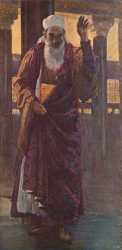Isaiah
"The salvation of Jehovah." The son of Amoz,1 who was apparently a man of humble rank. His wife was called "the prophetess,"2 either because she was endowed with the prophetic gift, like Deborah3 and Huldah,4 or simply because she was the wife of "the prophet."5 He had two sons, who bore symbolical names.
He exercised the functions of his office during the reigns of Uzziah (or Azariah), Jotham, Ahaz, and Hezekiah. Uzziah reigned fifty-two years, and Isaiah must have begun his career a few years before Uzziah's death. He lived till the fourteenth year of Hezekiah, and in all likelihood outlived that monarch, and may have been contemporary for some years with Manasseh. Thus Isaiah may have prophesied for the long period of about sixty-four years.
His first call to the prophetical office is not recorded. A second call came to him "in the year that King Uzziah died."7 He exercised his ministry in a spirit of uncompromising firmness and boldness in regard to all that bore on the interests of religion. He conceals nothing and keeps nothing back from fear of man. He was also noted for his spirituality and for his deep-toned reverence toward "the holy One of Israel."
In early youth Isaiah must have been moved by the invasion of Israel by the Assyrian monarch Pul;8 and again, twenty years later, when he had already entered on his office, by the invasion of Tiglath-pileser and his career of conquest. Ahaz, king of Judah, at this crisis refused to co-operate with the kings of Israel and Syria in opposition to the Assyrians, and was on that account attacked and defeated by Rezin of Damascus and Pekah of Samaria.9 Ahaz, thus humbled, sided with Assyria, and sought the aid of Tiglath-pileser against Israel and Syria. The consequence was that Rezin and Pekah were conquered and many of the people carried captive to Assyria.10 Soon after this Shalmaneser determined wholly to subdue the kingdom of Israel. Samaria was taken and destroyed (ca. 722 BCE). So long as Ahaz reigned, the kingdom of Judah was unmolested by the Assyrian power; but on his accession to the throne, Hezekiah, who "rebelled against the king of Assyria,"11 in which he was encouraged by Isaiah, who exhorted the people to place all their dependence on Jehovah,12 entered into an alliance with the king of Egypt.13 This led the king of Assyria to threaten the king of Judah, and at length to invade the land. Sennacherib led a powerful army into Palestine. Hezekiah was reduced to despair, and submitted to the Assyrians.14 But after a brief interval war broke out again, and again Sennacherib led an army into Palestine, one detachment of which threatened Jerusalem.15 Isaiah on that occasion encouraged Hezekiah to resist the Assyrians,16 whereupon Sennacherib sent a threatening letter to Hezekiah, which he "spread before the Lord."17 God then sent an angel to the Assyrian camp who killed "a hundred and fourscore and five thousand."18
The remaining years of Hezekiah's reign were peaceful.19 Isaiah probably lived to its close, and possibly into the reign of Manasseh, but the time and manner of his death are unknown. There is a tradition that he suffered martyrdom in the heathen reaction in the time of Manasseh.
The Book of Isaiah consists of prophecies delivered20 in the reign of Uzziah,21 (2) of Jotham,22 (3) Ahaz,23 (4) the first half of Hezekiah's reign,24 (5) the second half of Hezekiah's reign.25 The book, as a whole, has been divided into three main parts: (1) The first thirty-five chapters, almost wholly prophetic, Israel's enemy Assyria, present the Messiah as a mighty Ruler and King; (2) Four chapters are historical,26 relating to the times of Hezekiah; (3) Prophetical,27 Israel's enemy Babylon, describing the Messiah as a suffering victim, meek and lowly.
In Islam he is called Ash'iyā' (أشعیاء).
❧
References
Notes
- Isa. 1:1; 2:1.
- 8:3.
- Judg. 4:4.
- 2 Kings 22:14-20.
- Isa. 38:1.
- 1:1.
- Isa. 6:1.
- 2 Kings 15:19.
- 2 Kings 16:5; 2 Chr. 28:5, 6.
- 2 Kings 15:29; 16:9; 1 Chr. 5:26.
- 2 Kings 18:7.
- Isa. 10:24; 37:6.
- Isa. 30:2-4.
- 2 Kings 18:14-16.
- Isa. 36:2-22; 37:8.
- 37:1-7.
- 37:14.
- 37:36.
- 2 Chr. 32:23, 27-29.
- Isa. 1.
- 1-5.
- 6.
- 7-14:28.
- 14:28-35.
- 36-66.
- 36-39.
- 40-66.
Sources
- 27. 18.
- Easton, M.G. (1897). Easton's Bible Dictionary. New York: Harper & Brothers.
This article incorporates text from Easton’s Bible Dictionary (1897) by M.G. Easton, which is in the public domain.
